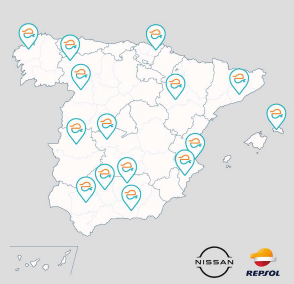- The first action will be to expand the fast charging system for electric vehicles through Repsol’s network of service stations.
- Anyone who owns a Nissan electric vehicle will be eligible for a 50% discount in the Repsol electric charging network.
After the successful Webinars I and II of the Fourth Nissan Forum, attended by over 1,000 people, today Webinar III, “Reflections on Charging Infrastructure for Electric Vehicles”, was held. It included the pres-ence of Repsol’s Executive Managing Director of Client and Low-Carbon Generation, María Victoria Zin-goni; the CEO of Nissan Iberia, Bruno Mattucci; and the Deputy Minister for the Environment of the regional government of Madrid, Mariano González. Access to Webinar III was provided through the website www.foronissan.es.
During the webinar, Zingoni and Mattuci announced the signing of a collaboration agreement between Repsol and Nissan to promote electric mobility in Spain. The first action will consist in expanding the electric vehicle charging network to cover all of Spain. Initially, 15 fast charging points will be installed at Repsol service stations, with further expansion in the future contemplated.
Through this agreement, all owners of a Nissan electric vehicle will enjoy a 50% discount in the Repsol public electric charging network. Repsol currently has more than 250 charging points in public spaces, including 70 fast charging points, the majority located at service stations. This positions the multi-energy company as a leader in the offering of this service at service stations in Spain. Additionally, it has over 1,000 private terminals installed at companies’ facilities and homes. It also has the first two ultra-fast charging points installed in the Iberian Peninsula that enable recharging of the vehicle batteries that sup-port this technology in five to ten minutes, similar to the time needed for conventional refueling.
Since the introduction of the electric vehicle in Spain and the launch of the Nissan LEAF in 2011, Nissan has developed the largest fast charging network distributed all over Spain through its dealer network, with a total of 140 charging points.
The development of the 15 new fast charging facilities at Repsol service stations, with the guarantee that the origin of the electricity is 100% renewable, has the potential to provide enough energy to travel more than 144,000 kilometers by car every month. Likewise, the installed capacity of all these new fast chargers would be sufficient to supply energy to 120 households for a month.

María Victoria Zingoni, Executive Managing Director of Client and Low-Carbon Generation at Repsol said: “This partnership with Nissan, one of the leading electric vehicle manufacturers in the world, strengthens our commitment to electric mobility and helps us continue the development of our network of fast charging points for electric vehicles in Spain.
Furthermore, it consolidates our position as a multi-energy company, one that is a leader in mobility and dedicated to achieving zero net emissions by 2050. We are the first company in our sector to set this ambitious target.”
Bruno Mattucci, CEO of Nissan Iberia, added: “Collaborating with a multi-energy company like Repsol in the development and expansion of the fast-charging network for electric vehicles in Spain will give all users of electric vehicles greater peace of mind and economic benefits, particularly in the case of owners of a Nissan LEAF or e-NV200 who will obtain discounts of 50% on the normal fee in the entire Repsol electric recharging network in Spain. There is no doubt that by solving the problem of charging infrastructure in this country, we will be able to position Spain as a leader in the race towards electrification.”
The Nissan CEO insisted that “stable plans for promoting the electric vehicle, as well as infrastructure development, are important for achieving a faster expansion of electrification in Spain. At the same time, the VAT on electric vehicles could be temporarily reduced to facilitate their purchase by citizens, a move that could triple our electric vehicle market. It would also be a good idea to eliminate or temporarily reduce the tax rate applied in the Special Tax on Electricity.”
There is a clear potential for improvement of the infrastructures for electric vehicles. Despite progress in this area, thanks to public as well as private investment by companies like Repsol and Nissan that are committed to expanding the long- and short-distance public and universal infrastructure, Spain today rep-resents only 2.9% of the total charging infrastructures for electric vehicles installed in Europe, while rep-resenting 10% of total vehicle sales in the EU and 15% of total vehicle manufacturing.
